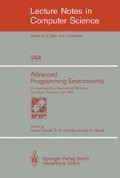Abstract
As the formal basis for a methodology of software development an algebraic approach is proposed that can be supported by powerful programming environments. Algebraic specifications are formulated with equations, based on first order partial logic. The paper contains a short description of the Passau RAP system for prototyping algebraically specified abstract data types. It outlines the position of the RAP system within a future software environment and explains the environment concept that is currently studied within the ESPRIT project 432 METEOR at the University of Passau.
Preview
Unable to display preview. Download preview PDF.
References
L. Bouge, N. Choquet, L. Fribourg, M. C. Gaudel: Test set generation from algebraic specifications using logic programming. Report No. 240, LRI, Orsay 1985. Preliminary version in: Proc. TAPSOFT 85 Conf., LNCS 186, pp. 262–265, 1985.
M. Broy, P. Pepper: Program development as a formal activity. IEEE SE-7:1, 1981, pp. 14–22.
M. Broy, B. Möller, P. Pepper, M. Wirsing: Algebraic implementation preserves program correctness. Science of Computer Programming 8, 1986.
K. Futatsugi, J. A. Goguen, J.-P. Jouannaud, J. Meseguer: Principles of OBJ2. Proc. 12th POPL Conf., 1985.
A. Geser: An algebraic specification of the intel 8085 microprocessor — A case study. Report MIP-8608, Universität Passau, May 1986.
A. Geser, H. Hussmann: Rapid prototyping for algebraic specifications — Examples for the use of the RAP system. Report MIP-8517, Universität Passau, Dec. 1985.
A. Geser, H. Hussmann: Experiences with the RAP system — a specification interpreter combining term rewriting and resolution techniques. Proc. ESOP 86 Conf., LNCS 213, pp. 339–350, 1986.
The CIP Language Group: The Munich project CIP, Vol. I: The wide spectrum language CIP-L. LNCS 183, 1985.
H. Ehrig, H.-J. Kreowski, B. Mahr, P. Padawitz: Algebraic implementation of abstract data types. Theoretical Computer Science TCS 20, pp. 209–263, 1982.
H. Hussmann: Unification in conditional-equational theories. Proc. EUROCAL 85 Conf., LNCS 204, pp. 543–553, 1985.
H. Kirchner: A general inductive completion algorithm and application to abstract data types. Proc. 7th CADE, LNCS 170, pp. 282–302, 1984.
M. Wirsing, P. Pepper, H. Partsch, W. Dosch, M. Broy: On hierarchies of abstract data types. Acta Informatica 20, pp. 1–33, 1983.
Author information
Authors and Affiliations
Editor information
Rights and permissions
Copyright information
© 1987 Springer-Verlag Berlin Heidelberg
About this paper
Cite this paper
Broy, M., Geser, A., Hussmann, H. (1987). Towards advanced programming environments based on algebraic concepts. In: Conradi, R., Didriksen, T.M., Wanvik, D.H. (eds) Advanced Programming Environments. Lecture Notes in Computer Science, vol 244. Springer, Berlin, Heidelberg. https://doi.org/10.1007/3-540-17189-4_113
Download citation
DOI: https://doi.org/10.1007/3-540-17189-4_113
Published:
Publisher Name: Springer, Berlin, Heidelberg
Print ISBN: 978-3-540-17189-8
Online ISBN: 978-3-540-47347-3
eBook Packages: Springer Book Archive

